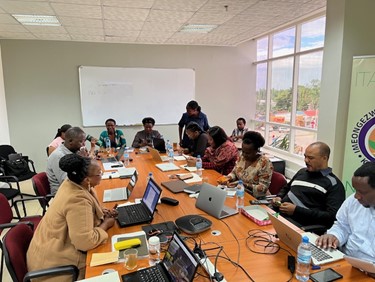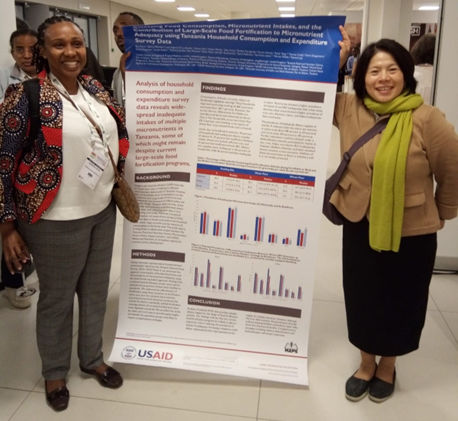Training to enable the modelling of dietary fortification options in Tanzania
Posted on 09 August 2024

Representatives from TFNC, USAID, NBS, TFNC and UoN in Dar es Salaam, May 2023.
This blog is jointly written by Dr. Rie Goto, Research Fellow at the London School of Hygiene and Tropical Medicine, Liberty Mlambo, Spatial Data Analysist in University of Nottingham, and Dr. Louise Ander from University of Nottingham. The contributors are researchers on our Micronutrient Action Policy Support (MAPS) project. Follow the team on X at @mnd_support.
Why the team came together for this activity
In an ideal world, public health nutrition experts would have access to directly collected information on diets and the nutrients those diets contain, using nutrition specific data collection approaches. However, these studies are time-consuming and therefore expensive to conduct, making them unusual at a scale which can help with nationally relevant nutritional information. Helping to fill that knowledge gap is the nationally representative socio-economic data from household consumption and expenditure surveys (HCES), collected by national statistical offices. Typically, HCES are routinely conducted every five years, capturing data on food consumption at a household level as part of a wider evaluation of household consumption and welfare. These HCES food consumption data can be combined with food composition data to generate estimates of energy and nutrient supplies and associated risks of deficiency. Furthermore, the potential effectiveness of interventions such as fortification of staple foods, can be modelled. Working with these data requires an understanding not just of nutrition, but also of data management and analysis techniques.
In Tanzania, the Tanzania Food and Nutrition Centre (TFNC) welcomed the opportunity to collaborate and strengthen their data science skills to use the national HCES data for nutrition purposes. The Micronutrient Action Policy Support (MAPS) project has developed methods to utilize HCES data to provide insights into dietary nutrient supplies and intervention modelling (e.g. Tang et al, 2021). These methods and derived datasets are feeding into the online MAPS tool, which provides users with information on population and food system micronutrient status in sub-Saharan Africa. During November 2022 – September 2023, the MAPS team undertook a research collaboration with the Tanzania Food and Nutrition Centre (TFNC) with additional funding from USAID Advancing Nutrition and coordinated by John Snow Institute.
In a collaborative effort between TFNC senior management and a team led by Dr. Edward Joy in London School of Hygiene and Tropical Medicine and Dr. Louise Ander in University of Nottingham, a training programme was designed to equip three early to mid-career professionals with the skills necessary for handling HCES data using the R software, a powerful programming language widely used for analysing, modelling and visualising data. The participants, Dr. Hoyce Mshida, Ms. Aleswa Mukasa, and Mr. Alex Amos, were from TFNC's Directorates of Community Health and Nutrition and Nutrition Policy and Planning, none of whom had prior experience with HCES data or R.
The project aimed to process recent HCES data from Tanzania, to model dietary nutrient supplies and the potential effectiveness of a priority food fortification intervention as requested by TFNC. The project also aimed to build capacity at TFNC to utilize HCES data for developing national food fortification strategies, and for wider nutrition-related objectives.
Our collaboration
 The training spanned 23 sessions, each lasting approximately 3 hours, and was structured into three key areas: navigating the R environment and (a web-based platform to store, manage, share and collaborate on code repositories with version control), processing and manipulating HCES data, and analysing nutrient supplies and deficiency risks using HCES data. Trainers led presentations and assigned tasks for the participants to complete in R, fostering active engagement and troubleshooting via shared screens on Zoom. Homework assignments were regularly given and submitted via GitHub for review, with additional online drop-in sessions available for personalised support. Six in-person sessions at TFNC further reinforced learning, enhancing collaboration and knowledge retention. Throughout the program, participants were empowered to harness the potential of R and GitHub, tapping into their vast online resources and supportive community for continued growth. The participants, and their wider TFNC colleagues, provided their expert insight into setting the Tanzania-specific nutrition modelling parameters.
The training spanned 23 sessions, each lasting approximately 3 hours, and was structured into three key areas: navigating the R environment and (a web-based platform to store, manage, share and collaborate on code repositories with version control), processing and manipulating HCES data, and analysing nutrient supplies and deficiency risks using HCES data. Trainers led presentations and assigned tasks for the participants to complete in R, fostering active engagement and troubleshooting via shared screens on Zoom. Homework assignments were regularly given and submitted via GitHub for review, with additional online drop-in sessions available for personalised support. Six in-person sessions at TFNC further reinforced learning, enhancing collaboration and knowledge retention. Throughout the program, participants were empowered to harness the potential of R and GitHub, tapping into their vast online resources and supportive community for continued growth. The participants, and their wider TFNC colleagues, provided their expert insight into setting the Tanzania-specific nutrition modelling parameters.
Participants in the training program expressed considerable satisfaction and motivation for further learning, indicating a strong endorsement of its effectiveness. Feedback on overall satisfaction and motivation to pursue additional training underscored participants' positive experiences.
Three workshops were also organised in Dar es Salaam in May, July and October 2023.
The second in-person workshop held 4 July 2023.
We proudly shared our findings on the modelling of Tanzania's large-scale food fortification program at the Micronutrient Forum conference in The Hague, Netherlands, during 16th - 20th October 2023. Our work resulted in a noteworthy manuscript titled 'Assessing Food Consumption, Micronutrient Intake, and the Impact of Fortification Using Tanzania Household Survey Data', now under peer review at Public Health Nutrition. The joint initiatives of TFNC and the MAPS project, supported by a thorough training programme, have not only equipped professionals with vital skills but have also paved the path for significant research and interventions in tackling malnutrition challenges, empowering research communities along the way. We greatly enjoyed the opportunity to begin collaboration between UK and Tanzanian nutrition researchers and look forward to continuing this fruitful partnership in the future. Thank you, TFNC and great Tanzania colleagues!

Dr Germana Layna (Director, TFNC) and Dr Rie Goto (London School of Hygiene and Tropical Medicine) at the Micronutrient Forum conference atThe Hague, with their very tall poster showing the research findings!